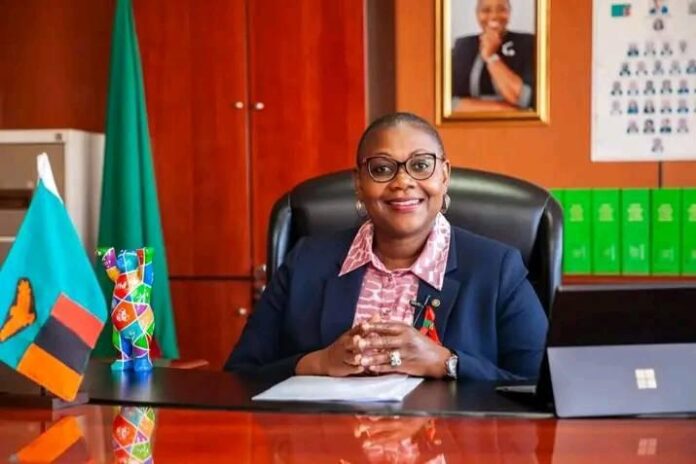Bill 7 Sparks Heated Parliamentary Debate Over Constitutional Reforms
Newsroom | June 26, 2025
LUSAKA — The presentation of Constitution Amendment Bill No. 7 to Parliament has stirred political tension and public scrutiny as lawmakers begin debating a range of proposed changes to Zambia’s supreme law ahead of the 2026 general elections.
Justice Minister Princess Kasune tabled the bill this week, outlining reforms that include the expansion of the number of parliamentary seats, structural realignments of government institutions, and the enhancement of oversight mechanisms. The bill has been referred to the relevant parliamentary committee for scrutiny, but its unveiling has already generated a flurry of debate among stakeholders, civil society groups, and opposition figures.
During her address to the National Assembly, Minister Kasune emphasized that the bill is part of the government’s broader strategy to modernize Zambia’s governance architecture and strengthen democracy. “This is a progressive step meant to realign our constitutional values with the realities of a growing and dynamic nation,” she said.
However, opposition parties and civil rights activists have sounded alarms over the timing and content of the proposed amendments. Party for National Unity and Progress (PNUP) leader Highvie Hamududu warned that the reforms risk undermining constitutional stability so close to a general election. “Any amendments that are not grounded in widespread consensus will be viewed with suspicion,” he said.
Civil society organisations including Chapter One Foundation and Transparency International Zambia (TIZ) have also questioned the public consultation process. They argue that the bill was introduced without adequate national dialogue, and that the perceived haste could erode public trust in the legislative process.
Editorials in independent newspapers such as News Diggers have called on lawmakers to reject the bill unless major revisions are made. “Bill 7 has not passed the test of inclusivity. Its content and context appear tailor-made to suit short-term political ends rather than long-term national interest,” the paper wrote.
Proponents of the bill within the ruling United Party for National Development (UPND) insist the reforms are necessary to ensure smoother governance and more efficient representation, especially in rural and newly demarcated constituencies. UPND Chief Whip Stafford Mulusa said the changes would enable better public service delivery.
The bill also touches on electoral reforms, judicial restructuring, and decentralisation, areas that have historically been sensitive in Zambia’s political discourse. Analysts warn that any missteps in handling these reforms could inflame political tensions and provoke voter backlash in 2026.
Meanwhile, constitutional law experts remain divided. Professor O’Brien Kaaba from the University of Zambia notes that while some proposals may be legitimate, their credibility is undermined if the public perceives them as top-down. “If constitutional changes are perceived as being politically motivated rather than people-driven, they will fail to endure,” he warned.
Speaker of the National Assembly Nelly Mutti has urged decorum and comprehensive debate. She reminded MPs that the integrity of the legislative process must remain above partisan interests. “Our constitution is the foundation of the Republic. It must be treated with reverence,” she said.
As the committee prepares to receive public submissions, all eyes are on how Parliament will balance political ambition with constitutional integrity. Whether Bill 7 will be adopted, amended, or rejected remains uncertain, but its introduction has already marked a pivotal moment in Zambia’s legislative and political landscape.



Life goes on!
In a disorderly fashion
@ Tikki indeed in a very disorderly manner and the silence over the constituencies marked for delimitation, what if the earmarked constituencies are all UPND strongholds, such as western, northwestern and southern province, won’t that mean we are simply increasing the UPND seats so that whatever law UPND proposes goes through unopposed…
1. We say no to BILL MU7
2. ECL will be buried in Sasa
I’m breaker and I approve this message
It does not matter whether they are strong wood or not, delimitation should go on and all over Zambia, delimitation is the song being sung now.
Collins Teembo
People must know where they are going to and where they are coming from. Give as the delimitation graphics. They don’t want top down handling of matters. A tree starts from the ground.
Give us the Zambia map showing the new constituency boundaries. We must know whether they are rightly or wrongly done. ECZ is a let down. Sorry, the president is a big disappointment for not letting us have such a map.
The buck stops here with the president.
If anything terribly bad happens, just know the president must take full responsibility. Considering our impasse in SA, the president must own up instead of hiding behind Judge Kabesha. He alone has the power to halt this problem. But he has chosen to smile at the confusions unfolding. If he chooses to override, the AG and withdraw the law suit, we can even bury tomorrow without waiting the whole length of time for judicial hearing, judgement and disposal.
Is it by coincidence that the president stopped the parliamentary debate because he did not see it fit to continue?
He did it because he knew that the next, following, day the concourt would rule against continued tinkering of our statutes using a lowlife puke in the name of bill 7. The judgement of the constitutional court has dealt a big blow on the presidency which hastily announced a temporary stop. So the best thing to do is chop it off completely instead of postponing it indefinitely.
Case citation:
Munir Zulu v The Attorney General and Ors –
2025/CCZ/0010
2025_ZMCC 7
Comments are closed.